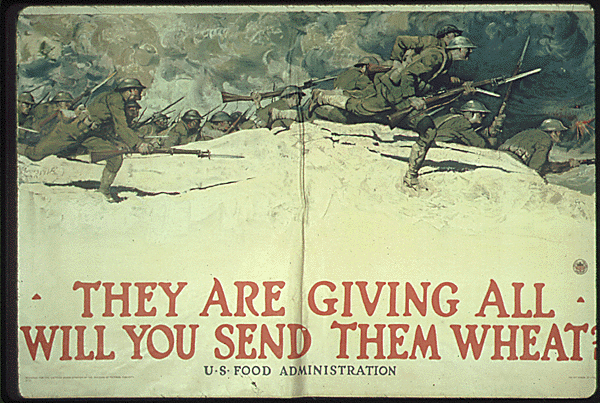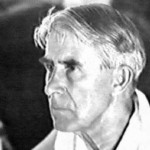Zane Grey’s World War I Novel: Vigilantes Fight Radical Unionism
 Western novelist Zane Grey and frontier historian Frederick Jackson Turner both believed that America’s true identity was forged during the westward migration. Hardship gave pioneers backbone. Self-reliance developed the moral character that made the nation into an international powerhouse.
Western novelist Zane Grey and frontier historian Frederick Jackson Turner both believed that America’s true identity was forged during the westward migration. Hardship gave pioneers backbone. Self-reliance developed the moral character that made the nation into an international powerhouse.
Both men knew that the frontier was pretty much wrapped up by the end of the 1800s. And when endings happen, there’s always a desperate attempt to document the loss. “What was ideal and heroic that we missed at the time?” is always the urgent question. Both Grey and Turner were in their prime during World War I (centenary was yesterday). Both could sense the epic struggle and national commitment.
Set on wheat farms in Washington state, Grey’s novel The Desert of Wheat (1918) explores themes that were unique in wartime America back then. The patriotism of recent German immigrants was still uncertain. The bloody Bolshevik Revolution had just overthrown centuries-old Czarist Russia. Bent on worldwide ideological conquest, German Communists were infiltrating the ranks of immigrants to plant union saboteurs in the US to undermine the war effort.
 In the novel, the Industrial Workers of the World (IWW) knew the food supply to the troops was a major logistical problem for the country. Burning crop fields and national forests was the goal of nasty, two-faced bands of migratory field workers of the IWW:
In the novel, the Industrial Workers of the World (IWW) knew the food supply to the troops was a major logistical problem for the country. Burning crop fields and national forests was the goal of nasty, two-faced bands of migratory field workers of the IWW:
“They’ve threatened your homes,” he said. “They’ve burned my wheat—ruined me. They were the death of my father.… These are facts I’m telling you. We can’t wait for law or for militia. We’ve got to meet this I.W.W. invasion. They have taken advantage of the war situation. They’re backed by German agents. It’s now a question of our property. We’ve got to fight!”
Wheat farmers saw it as their patriotic responsibility to act in national defense when their farms were being destroyed. A self-defensive vigilante spirit triggered a call to arms. For Grey (photo), fighting for family and country was almost a Darwinian quality that men had always responded to when urgency arose:
 Life of men was all strife, and the greatness in them came out in war. War searched out the best and the worst in men. What were wounds, blood, mangled flesh, agony, and death to men—to those who went out for liberation of something unproven in themselves? Life was only a breath. The secret must lie in the beyond, for men could not act that way for nothing. Some hidden purpose through the ages!
Life of men was all strife, and the greatness in them came out in war. War searched out the best and the worst in men. What were wounds, blood, mangled flesh, agony, and death to men—to those who went out for liberation of something unproven in themselves? Life was only a breath. The secret must lie in the beyond, for men could not act that way for nothing. Some hidden purpose through the ages!
 Western novelist Zane Grey and frontier historian Frederick Jackson Turner both believed that America’s true identity was forged during the westward migration. Hardship gave pioneers backbone. Self-reliance developed the moral character that made the nation into an international powerhouse.
Western novelist Zane Grey and frontier historian Frederick Jackson Turner both believed that America’s true identity was forged during the westward migration. Hardship gave pioneers backbone. Self-reliance developed the moral character that made the nation into an international powerhouse. In the novel, the Industrial Workers of the World (IWW) knew the food supply to the troops was a major logistical problem for the country. Burning crop fields and national forests was the goal of nasty, two-faced bands of migratory field workers of the IWW:
In the novel, the Industrial Workers of the World (IWW) knew the food supply to the troops was a major logistical problem for the country. Burning crop fields and national forests was the goal of nasty, two-faced bands of migratory field workers of the IWW: Life of men was all strife, and the greatness in them came out in war. War searched out the best and the worst in men. What were wounds, blood, mangled flesh, agony, and death to men—to those who went out for liberation of something unproven in themselves? Life was only a breath. The secret must lie in the beyond, for men could not act that way for nothing. Some hidden purpose through the ages!
Life of men was all strife, and the greatness in them came out in war. War searched out the best and the worst in men. What were wounds, blood, mangled flesh, agony, and death to men—to those who went out for liberation of something unproven in themselves? Life was only a breath. The secret must lie in the beyond, for men could not act that way for nothing. Some hidden purpose through the ages!